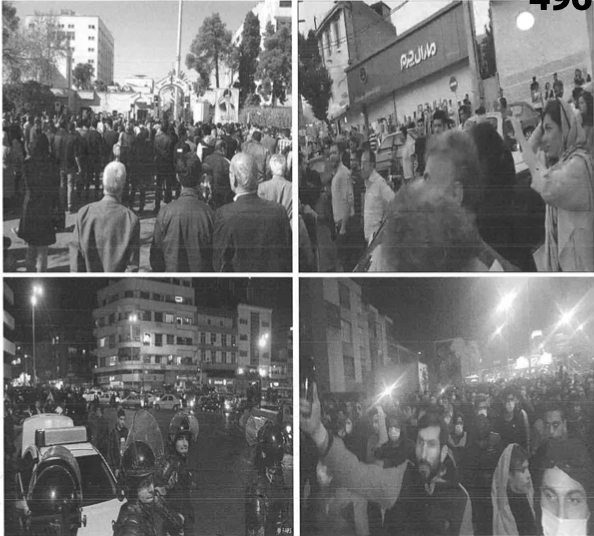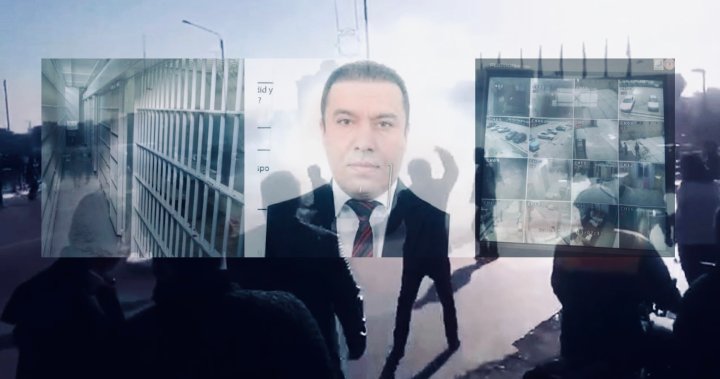
For 12 years, Roohollah Firooznam ran a company that installed and operated security cameras for Iran’s hardline regime.
The cameras were used to monitor detainees at prisons where torture took place, and to keep watch on political opponents.
Three directors of the company were senior members of the intelligence ministry. A former vice-president of Iran was a shareholder.
Firooznam’s business partner in another venture was a senior Islamic Revolutionary Guard Corps commander who spent a decade guarding Ali Khamenei, Iran’s Supreme Leader.
Nonetheless, in 2018 the Canadian embassy in Turkey gave Firooznam a travel visa after he proposed “visiting tourist attractions and sightseeing in Canada.”
Once in Toronto, he moved into an apartment with his wife and daughter, and hired an immigration lawyer, joining a wave of alleged associates of Iran’s regime in Canada.
A photo taken in Italy, from Roohollah Firooznam’s file in Federal Court.
Federal Court
Immigration officials would not say whether Firooznam was still in Canada five years later, or whether he had been sent back to his home country.
He did not respond to questions sent to the email address or phone number listed in his refugee claim, and the lawyers handling his cases declined to comment.
But Canadian court records show his company was deemed an “arm of the government” that enabled the “arbitrary detention and torture of detainees.”
An Ontario judge approved his deportation earlier this year on the grounds he was complicit in Iran’s crimes against humanity.
Last year, Canada imposed sweeping sanctions on members of Iran’s regime over their brutal suppression of anti-government protests.
The demonstrations erupted after Mahsa Amini was killed by Iran’s so-called morality police for showing her hair in public.
Iranian demonstrators face police at a protest for Mahsa Amini, in Tehran on Sept. 19, 2022. Photo by SalamPix/ABACAPRESS.COM.
Canada responded by designating Iran’s government a regime engaged in “terrorism and systematic and gross human rights violations.”
The policy effectively banned tens of thousands of senior Iranian officials and Revolutionary Guard members from entering Canada.
A year later, the effort is beginning to report progress, according to figures and records obtained by Global News.
The Canada Border Services Agency said it had begun proceedings against 10 Iranians under the sanctions.
Nine of those cases were being referred to the Immigration and Refugee Board for hearings that could result in deportation.
They include Seyed Salman Samani, 42, who is scheduled for proceedings on Jan. 3. One case was withdrawn after the alleged official left Canada, leaving eight.
Another 141 investigations are still underway, based partly on tips from the public, the immigration enforcement agency said.
Thirty-eight investigations have been closed after the individuals were either cleared or were not in Canada.
The CBSA also said it had screened 17,800 visa applications under the sanctions, and 78 Iranians were barred from entering Canada as a result.

“There are some individuals whose history demonstrates that they are not appropriate [for] entry into Canada, and we’ll do everything necessary to protect Canada’s national interest,” Defence Minister Bill Blair said on Wednesday.
But the volume of investigations raises questions about how Iranians with alleged ties to the regime have been able to enter Canada.
Vancouver lawyer Ram Joubin said Canadian officials should have screened out alleged regime associates like Samani before they arrived.
“The problem I have, when someone enters Canada, it’s actually very difficult to get them out, even if they are inadmissible,” said Joubin, who has been pushing CBSA to act against regime officials.
Joubin said he had identified about 700 “names and entities,” such as businesses, with suspected ties to Iran’s regime. About 300 of those are Iranians in Canada allegedly affiliated with the regime.
More than half are Canadian citizens, leaving about 150 for immigration authorities to deal with, he said.
He said their presence in Canada made community members feel unsafe.
“People come to Canada because Canada is supposed to be a free country and a safe country,” he said. “This type of individual actually curtails the ability for people to feel safe and to feel free.”
Shiraz Communication City
Although Firooznam’s case was already underway when the sanctions were imposed, he was similarly targeted over his alleged links to Iran’s regime.
A 43-year-old computer specialist, he served in the IRGC naval branch before becoming CEO of Shiraz Communication City in 2006, according to his immigration records, filed in Federal Court.
Security systems installed by Shiraz Communication.
Federal Court
Based in the southern city of Shiraz, the company sold and operated security cameras, mainly to government agencies, according to Federal Court records.
They included the police, prisons and Ministry of Intelligence and Security. The cameras were also installed in public places around Shiraz city.
The board of directors included members of the intelligence services, although Firooznam claimed he didn’t know that.
He was named board chair in 2009, the court records show. While he resigned that post in 2012, he stayed on as operations manager.
Security systems operated by Shiraz Communication City.
Federal Court
He also launched a solar energy firm with Mohammad Nezhad, aka Sardar Nejat, a top IRGC intelligence official, the court records indicate.
According to Radio Farda, Nejat spent 10 years as commander of the IRGC unit that protects Ayatollah Khamenei.
During four decades in the IRGC, Nejat also played a “key part” in suppressing protests in Tehran, according to the outlet.
Canada gave him visa for sightseeing
In the fall of 2017, Firooznam booked a two-week sightseeing tour of Ontario and B.C. through a Montreal travel agency, according to his court file.
The itinerary was an ambitious trek through Canada’s tourist attractions: the CN Tower, Niagara Falls, Stanley Park, Grouse Mountain.
Itinerary Firooznam used to get a travel visa from the Canadian embassy in Turkey.
The Canadian embassy in Turkey gave him a visa, court records show, but after he landed in Toronto, he hired a lawyer and filed for refugee status.
In his claim, he said he was unaware until recently that his company was being used against the anti-government opposition.
He said he thought the cameras deterred prison abuse, since interrogators did not want anyone seeing how they treated detainees.
But during protests in 2017 and 2018, he said he saw “demonstrators and ordinary people” being arrested and beaten.
The revelation prompted him to download 10 GB of data from Shiraz and give it to a contact in Sweden, he said.
Fearing for his life, he said, he flew to Toronto.
At his refugee hearing, Firooznam said he now considered the IRGC to be “a terrorist organization.”
He said it was “trying to suppress all those demonstrators” and “people who are opposing the government.”
Security systems in Shiraz, Iran, installed by Shiraz Communication City.
Federal Court
Although he claimed to have been unaware of the regime’s abuses, he acknowledged his brother had fled Iran.
The brother was arrested and beaten at a demonstration, he said. He said he felt bad about his brother, a refugee in Germany.
But he said he continued working with the regime through his company because “I had to make money.”
He said that when he realized his cameras were being used to target Iran’s anti-government opposition, he took action.
“Once I found out that and I saw with my eyes they were used against the opponents, I acted against the regime,” he testified.
The Refugee Board rejected his refugee claim in 2021 on the grounds he was complicit in Iran’s crimes against humanity.
The IRB found he made a significant contribution to the Iranian regime and that his statements were not credible.
The prisons he outfitted were known “for their use of cruel and prolonged torture of political opponents,” the IRB wrote.
Torture and other mistreatment such as solitary confinement were “endemic,” particularly during interrogations, it added.
The IRB did not believe his claim that he knew nothing about his company’s role in Iran’s abuses until 2017.
He appealed to the IRB’s Refugee Appeal Division and lost. He then appealed to the Federal Court, which ruled against him in April 2023.

Images of anti-government demonstrations Firooznam said he gathered in 2017 and 2018.
Federal Court
On Nov. 27, he filed yet another case, this time in the Federal Court of Appeal, seeking a decision on his immigration application.
Immigration, Refugee and Citizenship Canada had “failed to process” his application, according to his statement of claim.
He demands the government process his application in two weeks, and pay his legal costs and $10,000 in “damages for the delay.”
The appeal application does not mention that Canadian authorities have deemed Firooznam complicit in crimes against humanity.
The CBSA would not comment on Firooznam, citing privacy restrictions, but said it was obliged to remove those linked to crimes against humanity.
“The agency has a top priority to remove individuals involved in criminality, a history of war crimes, crimes against humanity or organized crime and those who are a risk to Canada’s national security,” spokesperson Maria Ladouceur said.

